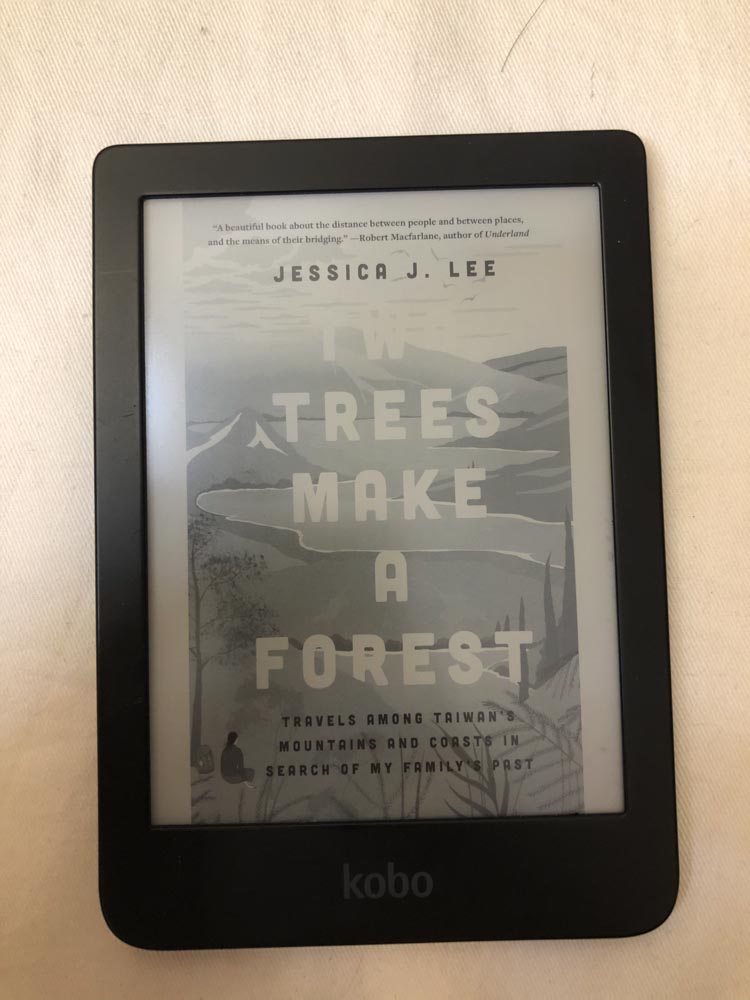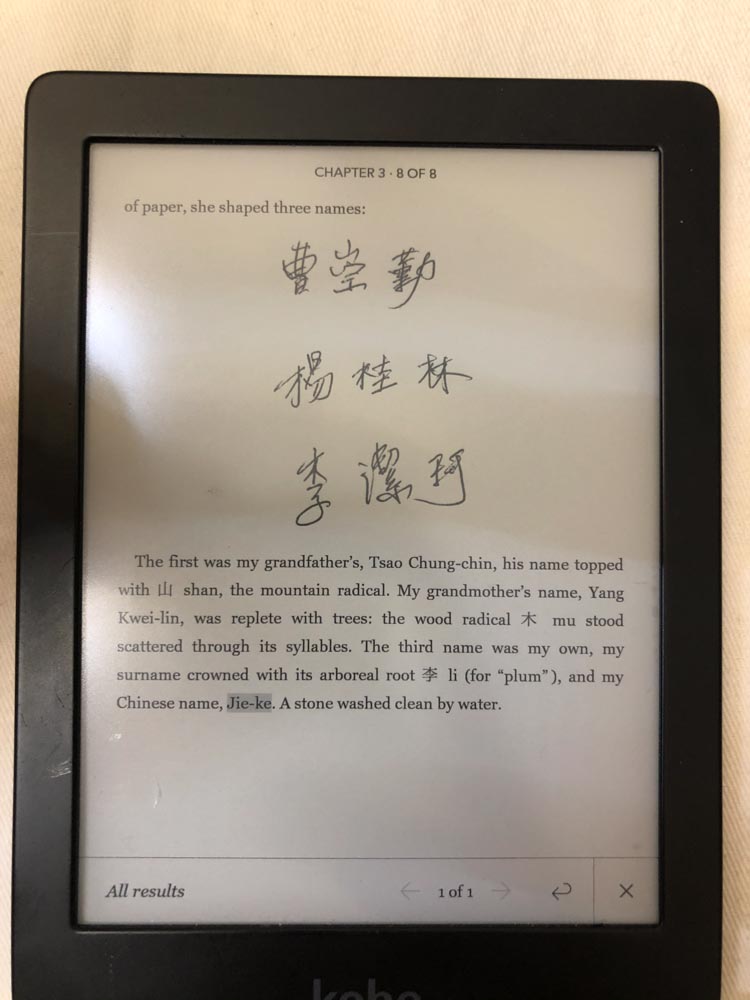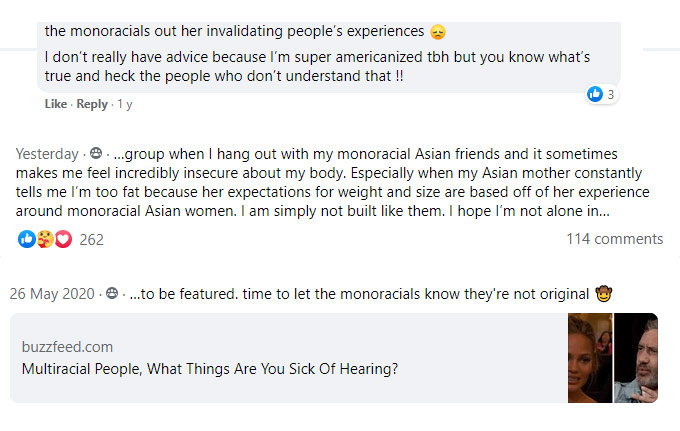
I’ve been reading Jessica J. Lee’s Two Trees Make a Forest.
The “J” in Jessica J. Lee is probably not the same as the “J” in Mary J. Blige.
Fortunately, she clarified that it’s Jie-ke, or 李洁珂. In Traditional Chinese, it would be 李潔珂. I am so glad I could read the scribbling from her mother.

The British-Canadian-Taiwanese author who grew up in Niagara Falls, Ont., is half-Welsh and half-Taiwanese, living in Germany now.
TL;DR book review
Two Trees Make a Forest has three distinct thrusts to it. First, it’s about Taiwanese flora and fauna. Then it’s about Taiwanese history. Then it’s about Jessica’s life in Taiwan.
You can tell that Jessica has put in mounds of effort in writing this. Apparently, she recorded her grandmother’s story 10 years ago and she travelled to Taiwan to speak to various sources as well as to go hiking.
The flora and fauna part really didn’t interest me. It’s like me telling someone not interested in cars about CVTs, limited-slip differentials and LED headlights. And just like when I get rejected, I’m going to repeat a common refrain: it’s not you (i.e. Jessica), it’s me. I just don’t care about plants except thyme because it’s important for steaks.
Jessica’s ability to chronicle her grandfather’s journey from China to Taiwan felt the most impressive of feats. From his time as a pilot in the Second World War and beyond to him getting sent to a care home in Taipei (more or less, awaiting death), she describes details as crisp and purposefully as every scene in Breaking Bad.
Then, they came to Niagara Falls and her grandfather couldn’t get his pilot credentials recognized and therefore ended up as a cleaner. Quite a good reminder of a Toronto satirical joke, “How do you find a doctor? Just enter a taxi.”
The pedant in me did notice that although she’s British and Canadian, Two Trees Make a Forest was completely in American English. Maybe it’s a maneuver done by the publishers. Might is right in the realm of language.
So where do I see similarities in her experiences navigating her Chinese identity and the people I’ve met?
Crappy Chinese language ability
Jessica described her Niagara Falls home, where she lived with her Taiwanese mother and maternal grandparents, as “an island unto itself.”
“It was the only place we spoke Mandarin; they were the people with whom [Jessica and her sister] explored that side of ourselves.”
It’s a theme repeated throughout some of my interviewees — Chinese at home and then English or Spanish outside of the home. It’s happened to Eva from Mexico, Eric from Peru, and Lily from Trinidad.
Jessica’s ability in Chinese isn’t very good, similar to the few overseas Chinese that I have interviewed and certainly my experience. You could compare my Chinese to fecal matter before I really put in some effort starting 2014. Say, have you read my piece about how we’ll all inevitably lose our ability to speak our heritage/ancestral language?
She went to Chinese school until she was eight, somehow dreading being the only half-Chinese kid in the classroom. Us “monoracials” really give them hell.

As a result, by the time she visited Taiwan, she described her Mandarin as “childlike.” The following quotes summarize her regrets.
“I hadn’t done enough. Hadn’t learned enough Mandarin, knew no Taiwanese at all, and hadn’t taken enough of an interest. We had been too foreign for my grandmother, too Western,” she wrote.
“My complacency, I know now, was a privilege afforded by distance, by the ease of light skin and features that passed for whiteness,” she wrote. “Instead, I negotiated the world as a dual citizen of Britain and Canada, casting my life in those frames of reference.
“For most of my life — until [her grandfather’s] Alzheimer’s, until his death — I gave it little thought.”
Estranged familial relations overseas
I ain’t got no clue of anyone who’s related to me who still lives in China.
An interviewee, Roberto, also told me something similar — that he knew he had cousins in China, met them a few times, but felt rather estranged from them. It echoes what Jessica wrote.
“Having only ever known our grandparents, my sister and I never learned those names,” she wrote. “Like so many children after 1949, she’d grown up without extended family.”
Associating with people from the same culture
Birds of the same feather flock together and so do people.
Jessica mentioned that she met a Taiwanese-American cinematographer who grew up in Los Angeles and Taipei. Her paragraph on what she saw in Charlene felt rather difficult to really rationalize, but here’s my hot take.
She said that she felt “drawn to her as if she holds some knowledge my family lacks.” At the same time, Jessica seemed to have an affinity with Charlene because of similar North American origins and therefore “traces of body and language that come from a life overseas.”
I suppose if somebody were to say “ain’t nobody got time for that,” a set of gestures must follow.
Most poignantly, I had a conversation with Lily Kwok from Trinidad, which I omitted in my final copy, where she told me that when she went to graduate school in Connecticut, she found herself being really close to a Jamaican PhD student because they could go full Caribbean.
I suppose it’s the same with me. When I meet someone from Malaysia or Singapore, we’d have much alike because we grew up in similar environments and have the same slang, swear words, gestures and mutual understanding.
Leave a Reply